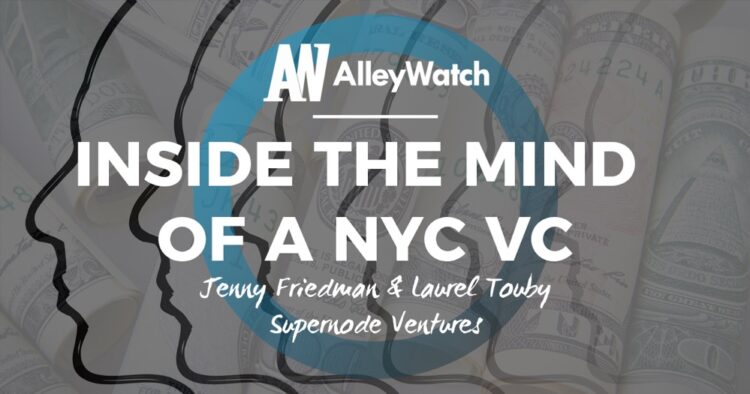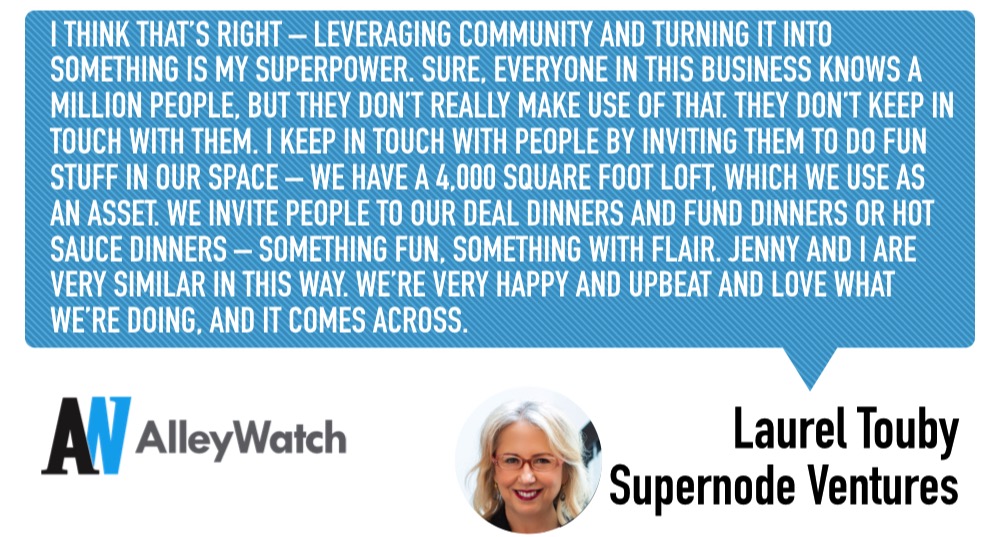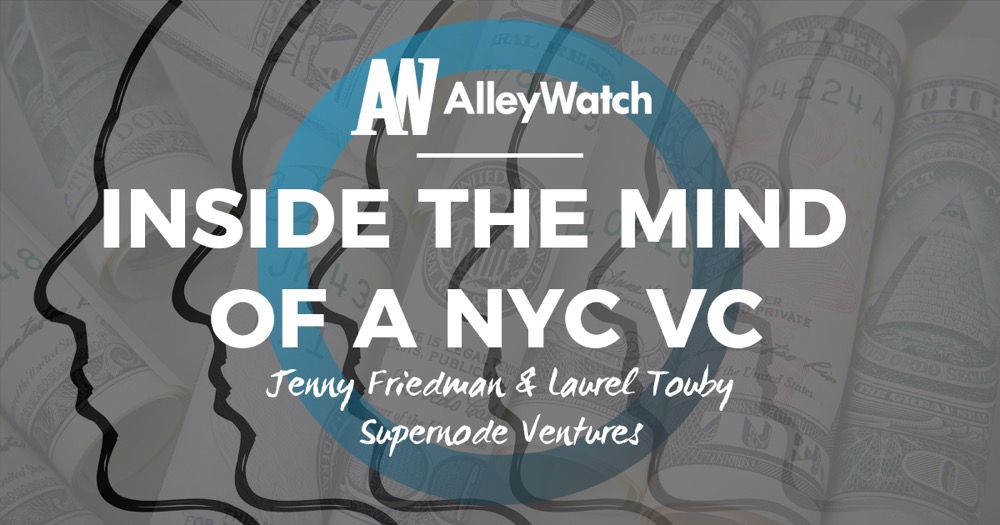
Welcome back to Inside the Mind of an NYC VC, a highly acclaimed series at AlleyWatch in which we speak with leading New York City-based Venture Capitalists. In this hot seat this time are Laurel Touby and Jenny Friedman, Managing Partners at Supernode Ventures, a pre-seed & seed-stage firm investing out of its debut fund. The Supernode portfolio includes investments in startups like Passport, Electric, Choosy, and New Age Meats.
Laurel and Jenny sat down with AlleyWatch to talk about how they decided to team up, competition and collaboration in the VC industry, the transition from angel investing to venture investing, and everything in between.
If you are a NYC-based VC interested in participating in this series, please send us an email. We’d love to chat. If you are interested in sponsoring this series that showcases the leading minds in venture in NYC, we’d also love to chat. Send us a note.
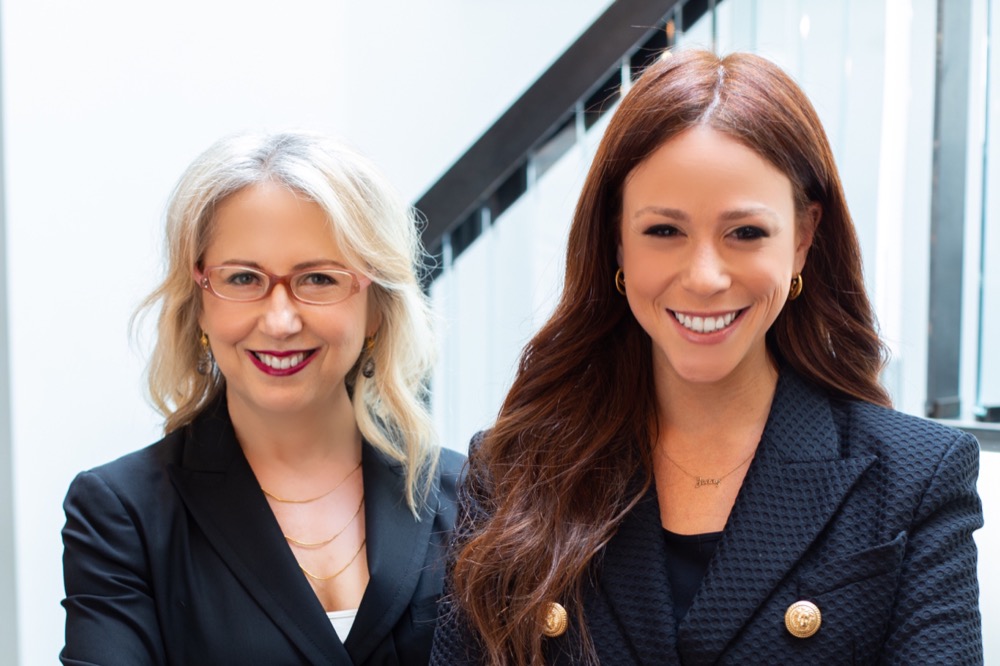
Bart Clareman, AlleyWatch: Tell us about your journeys into the venture business and how you came to found Supernode?
Laurel Touby, Supernode: Before I ever dreamed of doing venture, I was a founder, and before that I was in media. Somehow, by combining my founder instincts with my media skills, I created a venture firm that benefits from both.
The company I started was called mediabistro.com. Its entire premise was to gather people together in new ways. It was before the Internet became a thing – I started it in 1994 as an offline cocktail party. At that first party, there were only 10 guests, and I thought it was a great place to meet potential guys to date – I didn’t think of it as a business until later, once we had thousands of people in a database and an online presence. That’s when I realized, hey, this is something bigger than just a fun party – people are obsessed with this online job board I’ve created and the bulletin boards are stuffed with interesting conversations. My next thought was maybe there’s a way to monetize this and keep it authentic and true to me and not offend my user base, who were mainly journalists and media people, journalists, etc. That’s how the business began.
By 2012, I had sold mediabistro.com and completed my earnout. Applying that same instinct to gather people together with my skills as a business journalist, I began investing. After all, reporting out a business story isn’t all that different from diligencing a startup and learning about an addressable market. Over the next five years, I built my track record by creating a portfolio of 20 investments. My second investment in that vintage, Braze (then AppBoy) is now close to becoming a unicorn. Their last valuation was $850m.
I invested in a number of really great companies and realized I was pretty good at it – that’s when I teamed up with Jenny to start a more institutional fund
 Jenny Friedman, Supernode: My journey is a bit different. I was born and raised in New York City, went to UPenn for undergrad, and had spent my summers in investment management at Goldman Sachs. I took a job at Goldman straight after college – I really wanted to get into venture somehow but when headhunters would call me they’d want to place me into a similar asset management role, and I just didn’t see that as what I wanted for my future.
Jenny Friedman, Supernode: My journey is a bit different. I was born and raised in New York City, went to UPenn for undergrad, and had spent my summers in investment management at Goldman Sachs. I took a job at Goldman straight after college – I really wanted to get into venture somehow but when headhunters would call me they’d want to place me into a similar asset management role, and I just didn’t see that as what I wanted for my future.
I applied to Columbia Business School and was accepted with almost a year until I began enrollment. I wanted to use that time to maximize my exposure to tech and build a network in the ecosystem. I left Goldman and joined a startup called Minibar Delivery as a pre-MBA. I got great exposure to an early stage tech company focused on e-commerce, logistics, and marketplaces. Knowing I wanted to end up in VC, it was helpful to have experience on the operating side beforehand.
When I joined Minibar, the company was super early with very little financing – at that time, it was two cofounders, two engineers, a head of growth, and a head of marketing. It was a great experience working at a super scrappy early stage tech company, helping out with data analytics, business development, growth, and any other low hanging fruit. Once I started business school, I reached out to a friend from my sorority at Penn and asked her to introduce me to the LPs of her startup.
She introduced me to Eniac Ventures, which was run by four Penn alums – all engineers and former operators. Originally Eniac’s thesis was to focus on mobile first technology, which if you can believe it, was a novel edge back in 2014. They were early investors in Uber, Airbnb, TapAd, SwiftKey, etc – and were really building a presence both in NYC and in SF. Very atypical of landing a gig in VC, I interviewed with Nihal Mehta that morning and was lucky enough to receive an offer from him that same afternoon. My time at Eniac and having had Nihal as a boss was the greatest thing to happen to my career because he’s been such a great mentor, now co-investor, and friend. I was with Eniac throughout business school and a bit after.
How did you two decide to team up on Supernode?
Friedman: Laurel and I met when I was looking for a VC opportunity in New York – I knew I didn’t want to be in San Francisco. UJA Federation hosted an event where Howard Morgan [Co-Founder of First Round Capital] was speaking.
I was talking to someone who worked at Verizon in M&A, he asked what I was doing and I said I was looking around. He said, “you should meet Laurel, she’s here looking for a business partner.” Laurel gave me her card, I followed up with her via email, and the rest was sort of history. You know that statistic that says when you have a shotgun marriage it turns out better than a long drawn out situation? That’s what happened to us – and it’s been great.
Touby: At the time we were fundraising, and it was very tricky to talk to potential LPs and have them say to us “well, you barely know each other – how do we know you’ll be together in a year?” But it’s 18 months later and here we are.
Why were you looking for a partner in the first place?
Touby: I was looking for a shark. I was looking for something really special and extraordinary, and it was very hard to find among all the cookie-cutter – no offense – young white boys out there, who say all the right things, know all the right stuff, are fast-talking, they have deal flow… but they don’t have a certain something special.
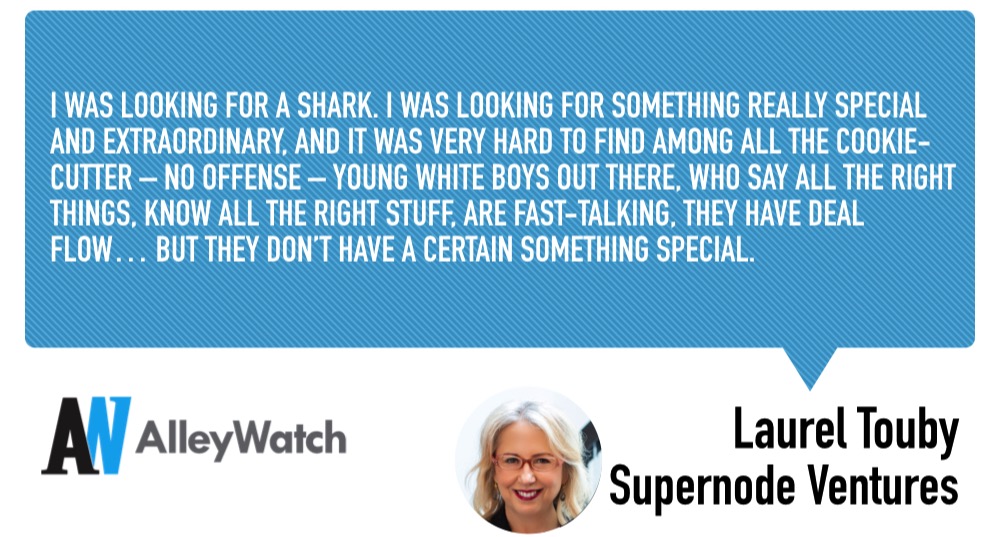
I met Jenny and I saw it – and I’m very good at talent spotting. I’ve done it with my founders and I’ve done it with my partner. She has incredible instincts, she has people sense, business sense, and financial chops, and those were the three things I wanted in a partner. And she hustles, man, like nobody’s business – some of those qualities were things I don’t have, that I needed to complement me. Every partnership needs two equals who are totally different but fit nicely together.
What were the conversations like with potential LPs? How did you convince them it was a marriage that was going to last and would be effective?
Touby: A lot of the early people who invested trusted me, because they knew me, and they knew I would make a smart decision on a partner and I wouldn’t bring someone in who wasn’t qualified, driven, hungry and excellent. They’d seen me work with interns and associates over the years and we always had great teams.
They trusted my instincts.
Friedman: Once you get to know Laurel well, you learn that she is fiercely loyal. Some of our LPs are founders of companies she’d invested in via Flatiron Investors [Touby’s angel vehicle] and she had been built and maintained strong relationships – they knew she wasn’t the sort of person who would let our partnership disintegrate.
For you Laurel, what have been the biggest changes going from an angel investor to running a venture fund? Beyond check size, what changes?
Touby: As an angel I didn’t feel I was taken as seriously – I thought that people looked at me as, “oh, that’s just someone dabbling in investing.” Even though I did it under an official name, called Flatiron Investors, I still felt that the deal terms weren’t quite as good. For example, I would be ignored on the pro rata rights on the next round, or the founders might not even tell me they were raising again, or they wouldn’t always list me in an article about their raise. Once I teamed up with Jenny and formed a fund it felt more real to the world.
Let’s talk about how you evaluate opportunities. With pre-seed and seed investments it always comes down to teams, markets, and products. On a percentage basis, how important for Supernode are each of 1) the team, 2) the market opportunity, and 3) the product itself?
Friedman: Considering how early we’re investing in companies, I’d say we weigh the team at about 70%.
Touby: I was just thinking that. I was just thinking 70%.
Friedman: After that, I’d put market at 20% and product at 10%. We always say “product-market fit,” but if there’s no market for a product you won’t get very far.
Also, we’re used to pivots. We have invested in companies pre-product, pre-revenue, pre-traction. At this stage, we are really making a bet on the entrepreneurs above all else. We have to trust that these founders are going to weather whatever storm comes their way. That said, we may still pass on a deal if even if the founders are fantastic but they’re going after way too niche of a market.
In terms of what we look for in a team, I think resiliency for founders is the most important quality – and personally for me, I am looking to invest in people whom I genuinely like and know I’d work well with together to create something special. I’ve passed on deals before in which all the boxes (product, market, traction, etc.) checked out but I didn’t have confidence in the founder. It’s like a marriage; you’re on this journey for 5-10 years, so the synergy between founder and VC has to be right.
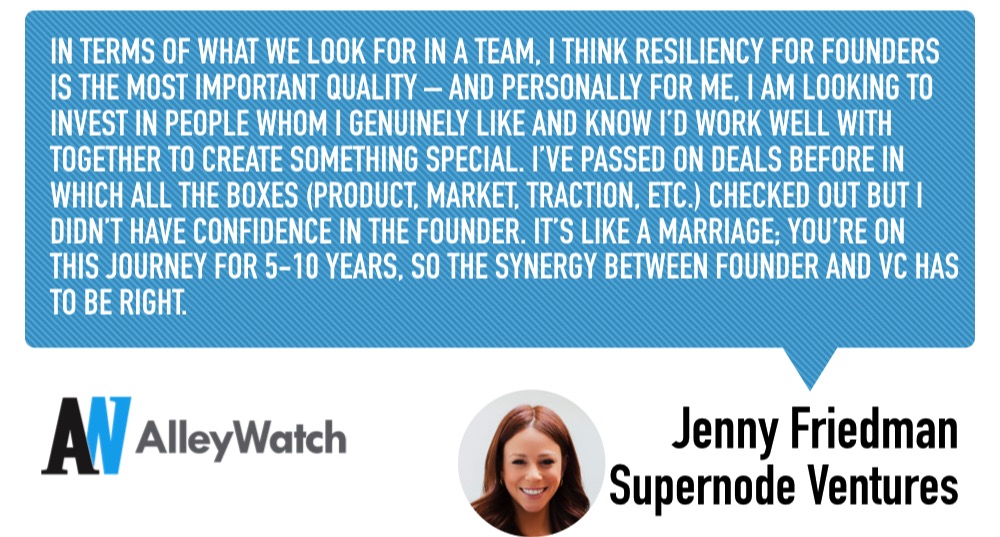
How do you evaluate resiliency – particularly with first-time founders who don’t have a track record of managing a pivot?
Touby: Over the years being a journalist I’ve learned to ask questions of CEOs to get answers and get past their PR sense and their ability to block and deflect. In this case, Jenny and I for sure ask the same tough questions all VCs ask, but I also like to ask some personal questions about their lives and their backgrounds and how they grew up, and in that way get to some very interesting signals about how they’ll deal with adverse circumstances.
If, for example, the founder has not had any challenges over the course of his or her life and has had a silver spoon existence and not had to fight their way through something tough – that says to me they haven’t been tested yet, so maybe that’s one box that doesn’t get checked in the resiliency column.
Friedman: Reference checks are very helpful and often they’re on a personal level. Some of these people are in your professional life, some you may know personally, but generally, they’re only separated by one degree. I’m all about digging deeper by asking the founders’ friends and other acquaintances.
Touby: One reason we’re called Supernode is because we really do leverage our network. We have a massive network and we pay a lot of attention to reaching out to diligence companies and people and markets and all kinds of things. I have 11,000 LinkedIn connections, we have another 15,000 people in a database that we tag. Jenny has her own network of probably 5,000 people in finance and from New York in general who are all doing interesting things.
With that as background, what does the quintessential Supernode portfolio company look like?
Friedman: We’ll invest in pre-seed and seed rounds. We’ll either write the first institutional check for a pre-seed investment, or we’ll join a syndicate at the seed stage if the company is a bit further along.
We like to see that there is something more defensible than just a brand. Even if it’s pre-product, we want to know how this company will differentiate itself from the competition. And if competition is lacking, we’ll need to understand why.
Our first investment was Choosy. We took a bet on them pre-seed; we thought the company was super interesting: using proprietary technology to scrape data on social media and gauge consumer interest in real time. They also had a moat in terms of supply chain arbitrage – so whether they chose to hone in on the tech or supply chain side, Choosy wasn’t going to be just another DTC apparel company.
Touby: I think they’re the perfect example of what our founders should look like if they’re pre-seed. They had already done a lot of customer research, that’s what blew me away. They had done 50-100 calls with customers, they had talked to customers in malls. They had a beta product online and had served customers and proven out their theory that they could do that.
That was one thing I loved about them – they were scrappy and they were hungry. They weren’t just talking about starting a business – they had already breathed life into this thing, and now they were looking for more fuel for the fire.
We have what we call our Founder Capability Matrix. There are six qualities that we look for in a founder – in addition to all the usual VC markers. The characteristics may be familiar to any good investor, but the difference is how we get to the answers. We’ve found a way to get to the answers by asking personal questions.
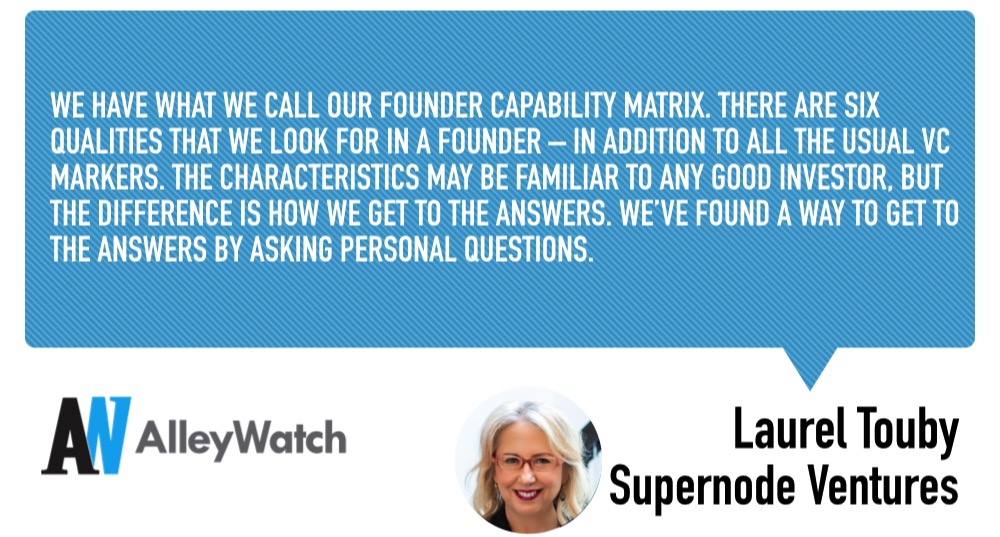
We screen for everything from Drive to something called “Locus of Control” – which means, the sense that you have control over your destiny. It’s different from confidence, it’s kind of a philosophy of life. That’s the kind of person I want to back – even if we all know they don’t have control over their destiny, nobody does, logically, but there’s this sense that they do, that they’re the master of their destiny. I love that type of person. And those are just a few of the Founder Capabilities we look for.
Beyond capital, what does Supernode bring to the table to help entrepreneurs?
Touby: There’s lots of things that differentiate us in terms of our vast connections and experience and strategic ability. Jenny can walk into a situation having to do with fundraising and identify what the holes are, what needs to be explained better, and who to contact. One of our companies might have been fundraising, Jenny can take a look at what they’re sending around and say to fix this up, change this, and these are the top people for you to reach out to. And then she’ll make the intros, she’ll take the time to push them to take the meeting, and it’s appropriate because she’s picked the right people. Some people just forward stuff, they’re just forwarding randomly, but Jenny is very targeted, and very calculated in getting the founder into the right meeting.
For my part, I do the same thing but for marketing and media – every founder, I don’t care what kind of company they’re building, is going to want to attract media. I’ll take a look at their first press release, I’ll look at the email they’re sending to that journalist, and we’ll make personal introductions to media people through a series of events that we do, called Tech Media Dinners. These are highly sought-after dinners with an audience that’s half journalists, half our portfolio, all of them geared toward introducing our founders to the right people.
We also do this with customers. If we can identify a customer base we’ll bring them together with our founders to meet.
Friedman: Although we are a generalist fund, I really like to own the space of investments I’m making. I’m less of a mile-wide inch-deep sort of person. For example, last summer I did a deep dive on traditional meat alternatives and spent months in diligence out to anyone with affiliation or knowledge in the space whether that meant entrepreneurs, sector-focused VCs, non-profits, researchers, academia, etc.
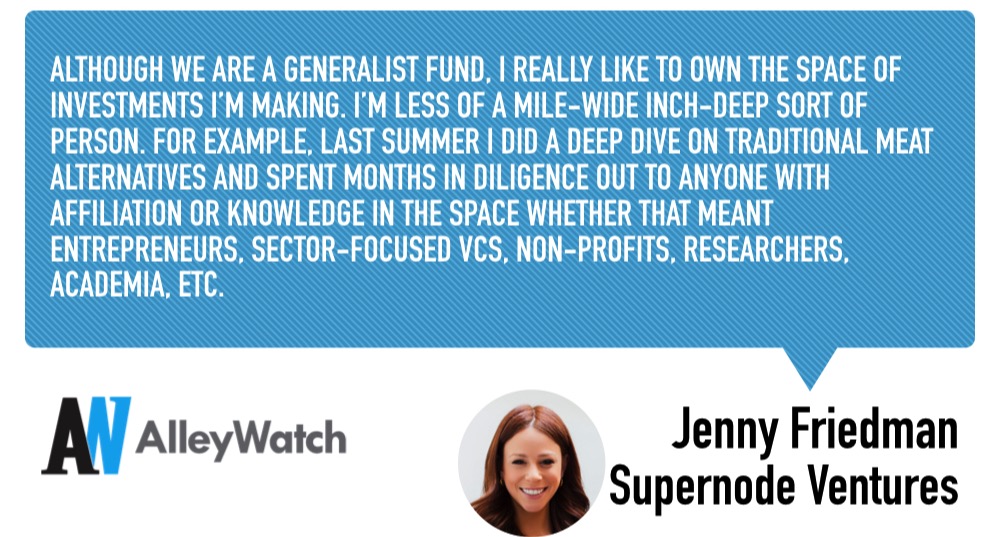
Doing a deep dive in a relatively nascent domain – in this case, cellular agriculture and synthetic biology – an area that requires so much time and education, makes my job all the more exciting. You become so fascinated, passionate, and immersed in a disruptive trend and genuinely feel a part of the inner circle of a community with a shared belief that said theme will ultimately have a metamorphic impact on society.
Jenny, you said earlier you were focused on doing venture in New York rather than San Francisco – what drove that?
Friedman: My bet is on the tech verticals here. While SF is known for its plethora of engineers in deep tech, NYC breeds top talent in other areas namely consumer (retail & e-commerce), fintech, healthcare, real estate, the list goes on. NYC also has a very manageable ecosystem. At this point I feel like I’ll know the majority of people at any given VC or tech event held here. Sometimes I’ll run into colleagues from other VCs three times in the same week. My relationships continue to strengthen as we co-invest with VCs in the same syndicates. In my opinion, SF is extremely congested, and it’s harder to differentiate yourself both personally and as a fund. I feel like I can be most helpful as an operating partner in NYC as a native New Yorker; I’ve developed such a vast network here and can really leverage my connections both personally and professionally.
My bet is on the tech verticals here. While SF is known for its plethora of engineers in deep tech, NYC breeds top talent in other areas namely consumer (retail & e-commerce), fintech, healthcare, real estate, the list goes on. NYC also has a very manageable ecosystem.
Do you only invest in NYC-based companies?
Touby: No, we’re agnostic. Most of our deals are going to be here. We want to be close to the founders so we can help them as much as possible, but we’ve done some in San Francisco. We have 2 non-New York, soon to be 3.
Let’s talk about sourcing – what are your tools for ensuring you’re seeing the right opportunities?
Touby: This is where Jenny’s hustle comes into play. We’ve divided and conquered. I do most of the fundraising, and she does most of the deal raising.
Friedman: As I said, I really like to go deep into a specific area that’s nascent enough in which you can canvas and identify nearly every person affiliated with the sector. When I began my hunt in cellular agriculture there must’ve been 60 people maximum on my list of people to track down. Now a year later that number has increased probably tenfold. My deep dives have made me a huge fan of cold outreach either via email or LinkedIn. If you’re targeting an esoteric trend, you’d be surprised at how readily willing people are to respond to a cold note and follow up with additional introductions to other like-minded enthusiasts. Identifying a very particular area of interest gives my job such purpose and allows me to feel extremely confident in my decision in adding a new investment to Supernode’s portfolio.
We found our first deal from another VC. I wouldn’t say this is the most reliable method of sourcing since I’m pretty skeptical when another seed stage VC passes a deal on to me citing that it’s “too early.”
Touby: That’s where I really rely on Jenny’s instincts – she has such a good spidey-sense of why this is not a hot deal.
Friedman: There’s definitely a lot of collaboration in the VC community. Choosy was the rare example of a situation in which another VC passed it to us as it was too early, but it was a very quality deal and we were immediately impressed by the team and its vision.
Founders of Supernode’s portfolio company or those from Laurel’s legacy angel fund are great sources of deal flow. I’ve found the best deals are found off the beaten path.
Touby: I love finding deals that nobody’s seen already.
What themes or trends are you watching closely?
Friedman: I’ve been spending time lately on micro-mobility. Regulations are changing in New York where electric bikes and scooters are currently illegal. E-transportation is wildly ubiquitous in cities where it is legal such as LA, Austin, Tel Aviv, etc.
I’m interested in some of the B2B applications, too, and trying to identify white space in the sector.
What’s one thing you wish you had known before entering the venture capital business?
Touby: How little positive feedback there is on an everyday basis. I’m used to having customers, to having an editor, I’m used to my editorial friends reading my stuff and giving me an atta-girl, I’m used to customers reading my stuff and sending atta-girl notes – or hate notes as it were, but at least it was attention. VCs get no love. I miss being in power, when I was in a media-related company – when I picked up the phone at Business Week, a public company CEO would feel obliged to take the call. Now we have the power of the pen in a different way, the power to write a check to a founder, but it’s not the same for me.
Beyond that, I wish I had known how little work other VCs do on diligence. I had thought that other VCs do diligence, but I have been shocked when I have asked for their diligence in order to do a syndicate with them. They’re not even calling a customer, or a potential customer, or anyone. They’re just flinging money, some of them.
How little positive feedback there is on an everyday basis. I’m used to having customers, to having an editor, I’m used to my editorial friends reading my stuff and giving me an atta-girl, I’m used to customers reading my stuff and sending atta-girl notes – or hate notes as it were, but at least it was attention. VCs get no love. I miss being in power, when I was in a media-related company – when I picked up the phone at Business Week, a public company CEO would feel obliged to take the call. Now we have the power of the pen in a different way, the power to write a check to a founder, but it’s not the same for me.
Beyond that, I wish I had known how little work other VCs do on diligence. I had thought that other VCs do diligence, but I have been shocked when I have asked for their diligence in order to do a syndicate with them. They’re not even calling a customer, or a potential customer, or anyone. They’re just flinging money, some of them.
Friedman: Entrepreneurs do not shy away at all from the “what can you do for me?” question, particularly if it’s a “hot” competitive deal. I didn’t realize how much we as VCs need to sell ourselves to founders.
Touby: She’s right. With the hottest founders, it’s not money they’re looking for – they’re getting offers of money. We have to sit there and explain to them, here’s what we bring to the table.
Friedman: It can be pretty political. As if finding a great deal isn’t tough enough, sometimes even after indicating interest in making a commitment, you need the founder or syndicate lead to fight for you to get on the cap table. Even very well established funds still have this challenge.
If a founder has the ability to be choosy when putting together his or her syndicate for one reason or another, (i.e. second or third time founder with a successful prior exit), he or she is likely going to prefer a group of established, renowned investors on the cap table to tons of angels and micro VCs who don’t offer as much cache. This is where differentiating yourself as a micro VC becomes very important. Larger funds that have been around for a while face competition too from other established VCs as they can be unwilling to waver from their particular mandates.
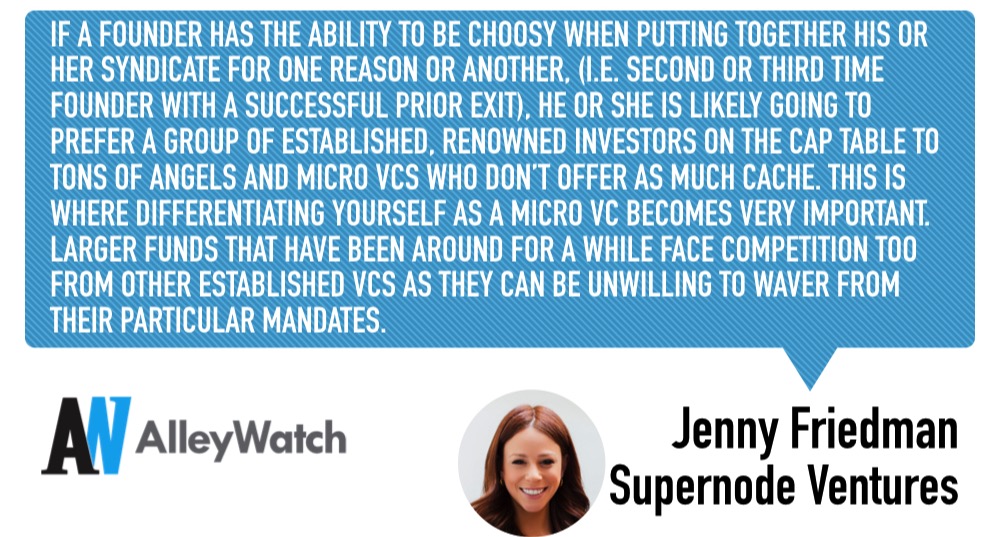
Sometimes people laugh when I say the VC community is collaborative. It is to an extent. I’d say it’s both collaborative and competitive.
Touby: That’s something I value in Jenny, her ability to hustle and get people at other funds to like her. They want to get her into the deal. We put in a small check, $50-100k, as our first check.
A question from Jenny’s friend Nihal Mehta at Eniac – what is your superpower, and what makes you a great investor?
Friedman: Earlier I spoke about my extensive network and my ability to leverage it. It’s particularly critical for a job in early-stage venture in terms of sourcing and deal flow, assistance with diligence from a domain expert, making introductions to enterprises/startups/SMBs for our portfolio companies, and so on. At Eniac they call Nihal the “human Rolodex” and I’d like to think I strive for people to think of me in the same way.
Touby: Jenny’s not your typical boring person – she’s smart, she’s savvy, she’s likable. Out in the world of social beings, Jenny’s a shark – she won’t stand still, she’s always hunting, she’s always pushing forward. But I guess she’s a nice shark.
Jenny has a larger-than-life personality, which comes across in her Medium posts – they’re thoughtful and informative, but they also showcase a bold sense of humor.
Friedman: Laurel is the ultimate connector and has done an incredible job making a name for our relatively new fund. I don’t expect everyone to be familiar with our fund as it’s super early, but I’m always shocked when I meet people for the first time and tell them I “started a new fund called Supernode with my partner” and they’ll stop me mid-sentence and say oh, you’re with Laurel” It happens all the time. She really is a community builder.
Touby: I think that’s right – leveraging community and turning it into something is my superpower. Sure, everyone in this business knows a million people, but they don’t really make use of that. They don’t keep in touch with them. I keep in touch with people by inviting them to do fun stuff in our space – we have a 4,000 square foot loft, which we use as an asset. We invite people to our deal dinners and fund dinners or hot sauce dinners – something fun, something with flair. Jenny and I are very similar in this way. We’re very happy and upbeat and love what we’re doing, and it comes across.
Friedman: We’ve become friendly with our portfolio companies on a personal level. We follow each other on social media, we text. We stay in close touch with them.
Touby: We stay in close touch with them and consequently they feel more comfortable with us and they tell us stuff early, so there are no surprises.
As far as what makes me a great investor, it’s turning that superpower into having insight into people, turning it into better diligence, turning it into more help for the founders, that’s how my superpower helps me be a better investor.
Friedman: We’ve been around for a year and a half and half of our portfolio has already been marked up by the best funds out there – I think it’s a testament to our investing acumen.
You’re 18 months into Supernode – how are you different as investors from when the fund got started?
Touby: We set about to create the most badass portfolio of 30 companies, we’re on our way to doing that, and we’ve always targeted really early stage companies of a certain valuation, and certain patterns of growth and possibility – that hasn’t changed at all. Our partnership has deepened, if anything.
Friedman: When we first started we were just going to be focused on pre-seed, but that’s shifted to split the fund between pre-seed and seed. I was surprised by how much more attracted I am to B2B companies.
Touby: And I’m surprised how I’ve been able to go over to the consumer side.
QUICK HITS:
2030 Vision: Give us one wild prediction for how the world will be different in 2030?
Friedman: We will not be killing any other living creatures for food consumption.
Touby: If we’re not dead – we will have solved the climate change problem with technology.
Favorite book and why?
Friedman: I love Sheryl Sandberg so I’m going to go with Option B: Facing Adversity, Building Resilience, and Finding Joy. I think it’s applicable to everyone in the world regardless of whether or not you’re in an emotionally vulnerable state.
Touby: Jared Diamond’s Collapse: How Societies Choose to Fail or Succeed – among other things, it’s about the destruction of civilizations brought on by the ways humans transform their physical environments. He goes through a number of civilizations and talks about the one single thing they did that changed the course of their histories. If you look at what we’re doing now, it’s a lesson.


